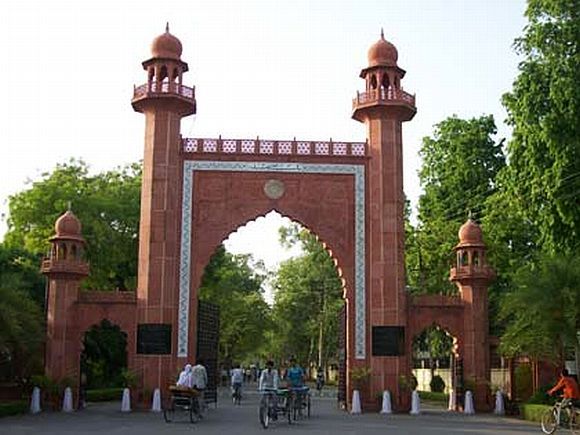 | « Back to article | Print this article |
 In a significant development, the Supreme Court on Tuesday referred the controversy over minority status for Aligarh Muslim University to a 7-judge bench, which will also lay down parameters for granting the tag to an educational institution.
In a significant development, the Supreme Court on Tuesday referred the controversy over minority status for Aligarh Muslim University to a 7-judge bench, which will also lay down parameters for granting the tag to an educational institution.
A three-judge bench headed by Chief Justice Ranjan Gogoi agreed with the submission of the AMU that the correctness of the 2006 judgement of the Allahabad high court, by which the minority tag to the university was taken away, needs to be examined in detail.
Senior advocate Rajeev Dhavan, appearing for AMU, submitted that the issue involved in the matter was important as the apex court in its 7-judge bench judgement in the TMA Pai case in 2002 did not deal with the aspect as to what should be the requirement for establishing a minority institution.
Since that question was not answered in the T M A Pai case which dealt with various issues concerning the minority institution, there was a need to examine it, he said.
Taking note of the submission, the bench, also comprising Justices L Nageswara Rao and Sanjiv Khanna, said the issue needs to be decided and referred the matter to the seven-judge bench.
Besides AMU, the then United Progressive Alliance government also filed an appeal against the 2006 verdict of the Allahabad High Court holding that the varsity was not a minority institution.
The Bharatiya Janata Party-led government at the Centre had in 2016 told the apex court that it will withdraw the appeal filed by the erstwhile UPA government as 'the previous stand (of the UPA government) was wrong'.
It said a five-judge Constitution bench in 1968 in the Aziz Basha case had held that AMU was a 'central university' and not a minority institution. It maintained that AMU was not a minority institution as it was set up the government and not by Muslims.
After the 1968 verdict, the AMU (Amendment) Act, 1972 and thereafter 1981 came into force.
The Allahabad high court had in January 2006 struck down the provision of the 1981 amendment Act by which the university was accorded the minority status.
Dhavan on Tuesday submitted that that there was contradiction in the Aziz Basha judgement by the five-judge bench as it said that minority institution can be established but if it is established by an statute it cannot be given a tag of minority institution.
Further, he said the issue needs to be examined in the backdrop of the fact that the National Commission for Minority Educational Institutions has been established by the government to protect and safeguard the educational institutions which are established by the religious minorities.
The NDA dispensation has contended that to circumvent the effect of the 1968 judgment, an amendment was brought in 1981 in the central act to accord minority status to the university which was held as unconstitutional by the high court.
In an affidavit, it has said the apex court cannot override the Aziz Basha judgment.
The division bench of the High Court on January 5, 2006 had upheld the order of its single judge passed in 2005 which had termed as "unconstitutional" the granting of minority status to AMU and 50 per cent reservation to Muslims in 2004.
In 2016, the Centre had said "It is the stand of the Union of India that AMU is not a minority university. As the executive government at the Centre, we can't be seen as setting up a minority institution in a secular state."
The Centre has maintained that the law laid down in Aziz Basha case by a five-judge bench of the SC on October 20, 1968 still holds ground.
AMU Act was enacted in 1920 dissolving and incorporating Mohammedan Anglo-Oriental (MAO) College. AMU (Amendment) Act in 1951 was passed by Parliament to do away with compulsory instruction in Muslim theology. The amendment opened membership of the Court of AMU to non-Muslims.
Changes were introduced by the 1966 amendment to AMU Act, which was challenged before the Supreme Court by S Aziz Basha.
The SC dismissed the petition in 1967 holding that AMU was not a minority institution because it had been established by an Act of Parliament and had not been set up by Muslims.
Another amendment to AMU Act in 1972 made the academic and executive councils more democratic and drastically reduced the nominees of the Visitor.